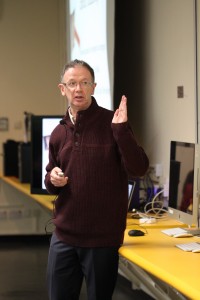Analogy, Causality, and Discovery in Science: The engines of human thought

College of Education, University of Maryland, College Park, US
This seminar is one of Winter Institute 2015 activities.
Abstract
Open a newspaper or webpage, read a textbook, visit a classroom, or take an online class with 60,000 fellow students, and you will be exposed to the most fundamental teaching and learning tool that the human mind has created: Analogy. Analogy, the understanding and creation of new knowledge using previously acquired knowledge is central to being human and is so frequently used that we often fail to note that it underlies all learning. Over the past 25 years, we have been investigating the use of analogy by students, scientists, and even politicians. Of note, often times analogies can fail to be effective, particularly in educational contexts. To understand why, in my laboratory, we have put analogy under the microscope, drawing empirical power from the exciting disciplines of The Science of Learning, and its deeply related discipline, Educational Neuroscience. We have discovered key situations and brain mechanisms underlying analogical thought and discovery that are needed for learning. Furthermore, in discovering why analogies can fail (in ways that I will identify), we have also found how we can propel the use of analogies that succeed. Here we have found that causal reasoning is often a triggering mechanism for the use of analogy and it can provide innovative opportunities for learning—both in and out of the classroom—as well as for explanation and further discovery.
About the speaker
Kevin Niall Dunbar is Professor of Human Development and Quantitative Methodology at the University of Maryland in College Park, just outside of Washington, D.C. He is director of the Laboratory for Thinking, Reasoning & Educational Neuroscience. Dr. Dunbar is one of the co-founders of the discipline of Educational Neuroscience (2001), one of the co-founders of the National Science Foundation’s Science of Learning Centers at Dartmouth College (Hanover, N.H. USA), called the Center for Cognitive and Educational Neuroscience (CCEN; 2004), and his research pioneers the related disciplines of the Science of Learning and Educational Neuroscience.
Dr. Dunbar seeks to uncover the neural, genetic, and socio-cognitive processes, which, together, underlie human Learning, Discovery and Creativity in the Sciences, the Arts, as well as in the real world. Dr. Dunbar conducts research using contemporary neuroimaging and behavioral methodologies (fMRI, fNIRS, ERP), DNA Genotyping, and DNA Microarrays, as well as traditional educational and psychological research methods. He has conducted research on the development of scientific thinking abilities in children, students, and scientists, as well as the effects and impact of educational experience on the human brain. Currently, he is using functional Magnetic Resonance Imaging (fMRI) and functional Near Infra-red Spectroscopy (fNIRS) neuroimaging methodologies to unravel the ways that the human brain processes scientific information and how brain activity changes as a function of educational experience. Dr. Dunbar is further pioneering the use of DNA microarrays (also known as “genechips”) and DNA genotyping to understand the genetics of human learning and cognition. Using these converging approaches, he has been able to articulate key components of the scientific mind, scientific and critical thinking, and how scientists can most optimally harness these components of scientific thinking in effective ways. He has also uncovered key components of human learning that contemporary science education needs to address as we face a future with an increasingly demanding scientific world.
Professor Kevin Niall Dunbar has served on the Editorial boards of the Journal of Experimental Psychology, Cognitive Psychology, and the Canadian Journal of Experimental Psychology. He has been the recipient of innumerable university and public lecture invitations and has given invited keynote addresses in Canada, USA, France, Sweden, Germany, Italy, Belgium, and Japan. In 2013, for example, he was invited to speak at the National Academy of Sciences on science communication; the International European Gender Summit on gender and science, the Annual meeting of the American Psychological Society, and the NSF Emerging Frontiers in Engineering. His work is of broad interest to those in educational policy and education, and he has attracted esteemed invitations from scientists across multiple disciplines; for example, he has been invited to speak to Geophysical scientists, Biologists, Engineers, and Immunologists. In winter 2015, he has been invited to present a prestigious address at The London School of Economics.
Professor Dunbar was born in the United Kingdom of Irish parents who returned to Ireland when he was a young boy, where he grew up. He received both his Bachelor’s and his Master’s degree in Logic & Psychology from the University College Dublin-National University of Ireland, in Dublin, Ireland (BA,1977; MA, 1979). He received his PhD in Psychology from the University of Toronto (1985), and was a post-doctoral fellow in the Department of Psychology at Carnegie-Mellon University to conduct research with Professor David Klahr on the development of scientific thinking (1985-1988. Professor Dunbar was a professor at McGill University in Montreal from 1988 to 2001, being promoted from Assistant, to Associate, and to Full professorships. In 2001, he was recruited to Dartmouth College (Hanover, N.H.) as a Full Professor in both the Departments of Psychological and Brain Sciences and the Department of Education. In 2007, he became Full Professor in the Department of Psychology at the University of Toronto, and, in 2011, he was thrilled to take on a Full Professorship at the University of Maryland. Professor Dunbar has been an invited visiting scholar at Stanford University in Stanford, California (1991-1992) and at the renowned hospital and research institute called, Istituto San Raffaele in Milan, Italy (1998-1999).
Email: kndunbar@umd.edu
Web sites: http://www.education.umd.edu/Academics/Faculty/Bios/index.cfm?URLID=kndunbar and http://www.mnc.umd.edu/faculty/dunbar
See http://umd.academia.edu/KevinDunbar for pdfs of publications
Name and Affiliation in brief
Professor Kevin Niall Dunbar
Director: Laboratory for Thinking, Reasoning, and Educational Neuroscience
Professor: Department of Human Development and Quantitative Methodology
College of Education, University of Maryland College Park
Posters
Related event
◎Winter Institute
Winter Institute 2015
Stimulating and Incubating Interdisciplinary Research on Learning



